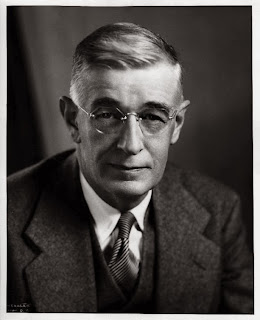In a letter dated November 17, 1944, President Roosevelt requested my recommendations on the following points:
(1) What can be done, consistent with military security, and with the prior approval of the military authorities, to make known to the world as soon as possible the contributions which have been made during our war effort to scientific knowledge?
(2) With particular reference to the war of science against disease, what can be done now to organize a program for continuing in the future the work which has been done in medicine and related sciences?
(3) What can the Government do now and in the future to aid research activities by public and private organizations?
(4) Can an effective program be proposed for discovering and developing scientific talent in American youth so that the continuing future of scientific research in this country may be assured on a level comparable to what has been done during the war?
Esta fue la carta que Vannebar Bush remitió al presidente de Estados Unidos ante la petición de este último de que realizase un informe de la ciencia respecto a los 4 puntos que se citan al principio del blog. En ese momento, Vannebar Bush dirigía la Oficina de Investigación y Desarrollo Científico, tras haber destacado en distintas aportaciones de ingeniería y haber pasado por distintos puestos de dirección de relevancia en el MIT y la Universidad Carnegie (fuente).
Hoy no es muy recordado en la historia de la IIGM, pero políticamente fue uno de los pensadores más influyentes. La popular revista Collier's estadounidense le describió como el hombre que podía ganar o perder la Guerra, y Wired lo ha definido como he essentially invented the world as we know it: not so much the things in it, of course, but the way we think about innovation, what it means, and why it happens (fuente).
Podríamos hablar extensamente sobre este interesante personaje, pero en este artículo del blog me limitaré a copiar algunos extractos del informe que redactó como respuesta al presidente Roosevelt. El documento se tituló Science, the Endless Frontier. Hoy en día sigue teniendo vigencia como base de cómo tratar la ciencia en la sociedad. Las cartas y el informe se pueden leer íntegras aquí.
Scientific Progress is Essential
Our population increased from 75 million to 130 million between 1900 and 1940. In some countries comparable increases have been accompanied by famine. In this country the increase has been accompanied by more abundant food supply, better living, more leisure, longer life, and better health. This is, largely, the product of three factors - the free play of initiative of a vigorous people under democracy, the heritage of great national wealth, and the advance of science and its application.
Science Is a Proper Concern of Government
It has been basic United States policy that Government should foster the opening of new frontiers. It opened the seas to clipper ships and furnished land for pioneers. Although these frontiers have more or less disappeared, the frontier of science remains. It is in keeping with the American tradition - one which has made the United States great - that new frontiers shall be made accessible for development by all American citizens.
Science and Jobs
One of our hopes is that after the war there will be full employment, and that the production of goods and services will serve to raise our standard of living. We do not know yet how we shall reach that goal, but it is certain that it can be achieved only by releasing the full creative and productive energies of the American people.
Surely we will not get there by standing still, merely by making the same things we made before and selling them at the same or higher prices. We will not get ahead in international trade unless we offer new and more attractive and cheaper products.
The Importance of Basic Research
Basic research leads to new knowledge. It provides scientific capital. It creates the fund from which the practical applications of knowledge must be drawn. New products and new processes do not appear full-grown. They are founded on new principles and new conceptions, which in turn are painstakingly developed by research in the purest realms of science.
Nature of the Problem
The responsibility for the creation of new scientific knowledge rests on that small body of men and women who understand the fundamental laws of nature and are skilled in the techniques of scientific research. While there will always be the rare individual who will rise to the top without benefit of formal education and training, he is the exception and even he might make a more notable contribution if he had the benefit of the best education we have to offer.
Publication Should Be Encouraged
We should get this scientific material to scientists everywhere with great promptness, and at as low a price as is consistent with suitable format. We should also get it to the men studying overseas so that they will know what has happened in their absence.
No se puede separar la creación de Sillycon Valley, la WWW, y a personajes como Steve Jobs y Bill Gates sin la influencia de Bush. En algunos sitios, a Bush se le considera el ingeniero de la guerra, ya que una persona de su valía ocupó distintos cargos en instituciones de desarrollo bélico. Sin embargo, prefiero quedarme con la idea de que sus intenciones eran otras más allá de emprender guerras.



0 comentarios:
Publicar un comentario